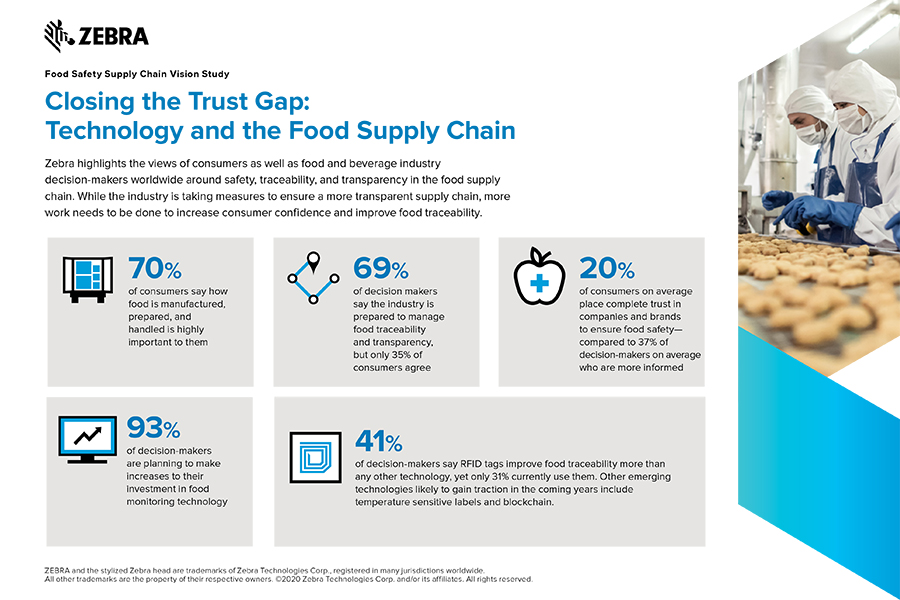
The Zebra Vision Study Report on technology and the food supply chain checks the pulse of industry and public perception around safety, traceability and transparency.
According to a Zebra Technologies Corporation study, slightly more than 80% of consumers surveyed said companies play an important role in implementing food safety solutions. They have an ethical responsibility to ensure the safe handling of their food. Most consumers (70%) said it is important to know how their food and ingredients are manufactured, prepared and handled, while 69% agreed knowing how their food is sourced is also important. On average, less than 40% of food and beverage (F&B) industry decision-makers place complete trust in the industry to ensure food safety
Zebra’s Food Safety Supply Chain Vision Study highlights the views of consumers as well as F&B decision-makers worldwide from distribution and warehouses to grocery stores and restaurants around safety, traceability and transparency.
Surveyed consumers reported their top food safety concerns include restaurant kitchen and wait staff hygiene, foodborne outbreaks, illness from contaminated food and F&B recalls. Consumers can be quite unforgiving if they experience a food incident as approximately 6 in 10 reportedly would never eat at a restaurant again if they contracted a foodborne illness or food poisoning.
With an increased focus on health and wellness, it’s unsurprising that both consumers and industry decision-makers are showing a great level of interest in the source, quality and safety of their food. However, a disconnect exists between what consumers believe and what industry decision-makers think. Almost 7 in 10 (69%) decision-makers say the industry is prepared to manage food traceability and transparency, but only 35% of consumers agree. Furthermore, only 13% of consumers felt the industry was extremely prepared today to manage food traceability and be transparent about how food travels through the supply chain, whereas 27% of decision-makers reported feels this way. Unfortunately, this is not just a short-term challenge as approximately half (51%) of surveyed F&B decision-makers said meeting consumer expectations will remain a challenge in five years.
Commenting on how Companies play an important role in implementing food safety, Mark Wheeler, director of supply chain solutions, Zebra Technologies, said, “Findings from our study show that while the industry is taking measures to ensure a more transparent supply chain, more work needs to be done in order to increase consumer confidence and improve food traceability. Businesses naturally have more information available to them but can improve consumers’ faith in their food sources by providing them access to the same information.”
One bright spot identified in the research is the role that technology can play in closing both these gaps in both the short- and long-term.
An overwhelming majority (90%) of decision-makers acknowledged that investments in traceability-focused solutions will provide them with a competitive advantage by enabling them to meet the expectations of consumers. When asked about the top benefits that technology-based track and trace solutions would provide, nearly 6 in 10 decision-makers cited risk reductions with proper handling, transportation and storage and tracking product perishability. Forty-one percent of industry decision-makers reported RFID tags improve food traceability within the supply chain more than any other technology, yet only 31% currently use them within their own organisations.
Mobile computers, mobile barcode label/thermal printers, rugged scanners and specialty labels and tags will also be key enablers in winning consumer trust and delivering more transparent information to consumers. Approximately 90% of surveyed industry decision-makers expect to use rugged handheld mobile computers with scanners, rugged barcode scanners and mobile barcode label/thermal printers within the next five years to digitally manage and track food products and related information.
For all the latest retail news from the Middle East, follow us on Twitter and LinkedIn, like us on Facebook and subscribe to our YouTube page.
Notifications